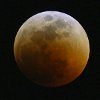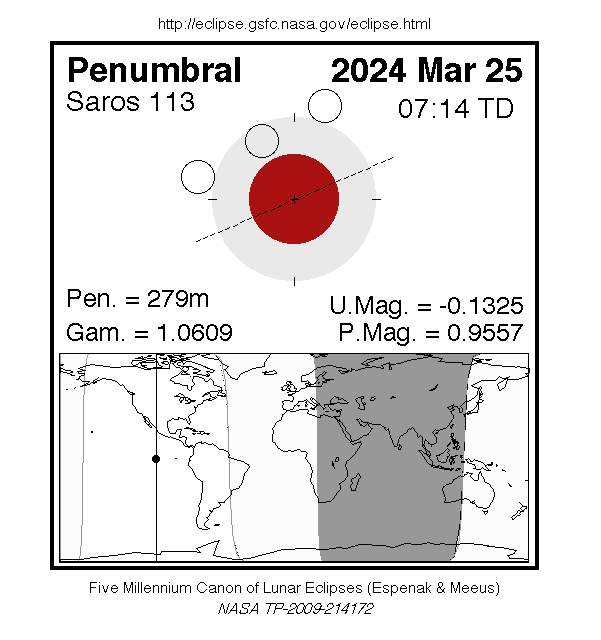Penumbral lunar eclipse on March 25 2024 (Antarctica)

The Moon information shown here applies to Vostok, Antarctica on Monday, March 25, 2024. (Local time Antarctica/Vostok)
| Moonrise to moonset | 10h29m |
| Moonrise | 16:29 |
| Moonset | 06:00 |
| Distance to the center of the Sun | 149,209,647 km |
| Distance to the center of Earth | 405,207 km |
| Moon ilumination (at midnight) | 99.7% |
| Lunar phase | waxing |
| Current zodiac sign the Moon | Virgo ♍ |
| Moon age (days past new moon) | 14.3 |
According to international time UTC, a lunar eclipse will occur on March 25, 2024 which will be visible in some parts of the world. The following shows the cities in Antarctica from which the eclipse could be visible (note that the following is a short list of some of the main cities, the eclipse may be visible from other cities not listed here). The date and local time of the event shown below.
| City | Eclipse visible? | Phase |
|---|---|---|
| Vostok | No | - |
| Aboa Station | Yes | Penumbral |
| Amundsen–Scott South Pole Station | Yes | Penumbral |
| Capitán Arturo Prat Station | Yes | Penumbral |
| Casey Station | No | - |
| Concordia Research Station | No | - |
| Davis Station | No | - |
| Doctor Sobral | Yes | Penumbral |
| Elephant Island | Yes | Penumbral |
| Escudero Station | Yes | Penumbral |
| General Belgrano Station | Yes | Penumbral |
| General Bernado O’Higgins Station | Yes | Penumbral |
| Great Wall Station | Yes | Penumbral |
| Halley Research Station | Yes | Penumbral |
| Maitri Station | Yes | Penumbral |
| Mawson Station | No | - |
| Mirny Station | No | - |
| Neumayer–Station III | Yes | Penumbral |
| Orcadas Station | Yes | Penumbral |
| Palmer Station | Yes | Penumbral |
| Peter I Island | No | - |
| San Martín Station | Yes | Penumbral |
| Scott Base | Yes | Penumbral |
| Signy Island | Yes | Penumbral |
| Svea Station | Yes | Penumbral |
| Teniente Jubany Station | Yes | Penumbral |
| Tor Station | Yes | Penumbral |
| Troll Station | Yes | Penumbral |
| Wasa Station | Yes | Penumbral |
| Zhongshan Station | No | - |
Information about this eclipse
 This image shows the global map with two regions: the shaded region where you can not see the lunar eclipse, and the blank region, where it can be seen. The image details the type of eclipse, the magnitude of the penumbra and umbra, Saros series to which this eclipse belongs, among other data. The date and time displayed in this image are international date and time, therefore, they might not apply to your country. However, to know the date and exact time of penumbral lunar eclipse in your country, you can see the table below. (Click on the image to enlarge it).
This image shows the global map with two regions: the shaded region where you can not see the lunar eclipse, and the blank region, where it can be seen. The image details the type of eclipse, the magnitude of the penumbra and umbra, Saros series to which this eclipse belongs, among other data. The date and time displayed in this image are international date and time, therefore, they might not apply to your country. However, to know the date and exact time of penumbral lunar eclipse in your country, you can see the table below. (Click on the image to enlarge it).
Eclipse schedule in Antarctica
The following table shows the schedule and phases of the penumbral lunar eclipse of March 25, 2024 in Antarctica. For each city we have assigned a time zone which is very precise and it takes into account Daylight Saving Time (if applicable).
Moon alt.: Excellent Good Low Too low
| City | Details | ||||||||||||||||
|---|---|---|---|---|---|---|---|---|---|---|---|---|---|---|---|---|---|
| Event date | Pen. Mag. | Umb. Mag. | Penumbral eclipse begins | Moon alt. | Partial eclipse begins | Umbral eclipse begins | Max. eclipse begins | Moon alt. | Umbral eclipse ends | Partial eclipse ends | Penumbral eclipse ends | Moon alt. | |||||
| Aboa Station (UTC 6) | 2024-03-25 | 95.6% | 0% | 10:53 | 7 | - | - | 13:13 | 0 | - | - | 15:32 | -8 | ||||
| Amundsen–Scott South Pole Station (UTC 6) | 2024-03-25 | 95.6% | 0% | 10:53 | 0 | - | - | 13:13 | 0 | - | - | 15:32 | 1 | ||||
| Capitán Arturo Prat Station (UTC 6) | 2024-03-25 | 95.6% | 0% | 10:53 | 27 | - | - | 13:13 | 19 | - | - | 15:32 | 5 | ||||
| Doctor Sobral (UTC 6) | 2024-03-25 | 95.6% | 0% | 10:53 | 7 | - | - | 13:13 | 4 | - | - | 15:32 | -1 | ||||
| Elephant Island (UTC 6) | 2024-03-25 | 95.6% | 0% | 10:53 | 27 | - | - | 13:13 | 18 | - | - | 15:32 | 4 | ||||
| Escudero Station (UTC 6) | 2024-03-25 | 95.6% | 0% | 10:53 | 27 | - | - | 13:13 | 19 | - | - | 15:32 | 5 | ||||
| General Belgrano Station (UTC 6) | 2024-03-25 | 95.6% | 0% | 10:53 | 9 | - | - | 13:13 | 4 | - | - | 15:32 | -2 | ||||
| General Bernado O’Higgins Station (UTC 6) | 2024-03-25 | 95.6% | 0% | 10:53 | 26 | - | - | 13:13 | 18 | - | - | 15:32 | 4 | ||||
| Great Wall Station (UTC 6) | 2024-03-25 | 95.6% | 0% | 10:53 | 27 | - | - | 13:13 | 19 | - | - | 15:32 | 5 | ||||
| Halley Research Station (UTC 6) | 2024-03-25 | 95.6% | 0% | 10:53 | 10 | - | - | 13:13 | 3 | - | - | 15:32 | -5 | ||||
| Maitri Station (UTC 6) | 2024-03-25 | 95.6% | 0% | 10:53 | 2 | - | - | 13:13 | -9 | - | - | 15:32 | -16 | ||||
| Neumayer–Station III (UTC 6) | 2024-03-25 | 95.6% | 0% | 10:53 | 8 | - | - | 13:13 | -2 | - | - | 15:32 | -12 | ||||
| Orcadas Station (UTC 6) | 2024-03-25 | 95.6% | 0% | 10:53 | 26 | - | - | 13:13 | 14 | - | - | 15:32 | -2 | ||||
| Palmer Station (UTC 6) | 2024-03-25 | 95.6% | 0% | 10:53 | 25 | - | - | 13:13 | 19 | - | - | 15:32 | 7 | ||||
| San Martín Station (UTC 6) | 2024-03-25 | 95.6% | 0% | 10:53 | 22 | - | - | 13:13 | 17 | - | - | 15:32 | 7 | ||||
| Scott Base (UTC 6) | 2024-03-25 | 95.6% | 0% | 10:53 | -6 | - | - | 13:13 | 1 | - | - | 15:32 | 8 | ||||
| Signy Island (UTC 6) | 2024-03-25 | 95.6% | 0% | 10:53 | 26 | - | - | 13:13 | 14 | - | - | 15:32 | -2 | ||||
| Svea Station (UTC 6) | 2024-03-25 | 95.6% | 0% | 10:53 | 7 | - | - | 13:13 | -1 | - | - | 15:32 | -9 | ||||
| Teniente Jubany Station (UTC 6) | 2024-03-25 | 95.6% | 0% | 10:53 | 27 | - | - | 13:13 | 19 | - | - | 15:32 | 5 | ||||
| Tor Station (UTC 6) | 2024-03-25 | 95.6% | 0% | 10:53 | 4 | - | - | 13:13 | -6 | - | - | 15:32 | -14 | ||||
| Troll Station (UTC 6) | 2024-03-25 | 95.6% | 0% | 10:53 | 4 | - | - | 13:13 | -5 | - | - | 15:32 | -13 | ||||
| Wasa Station (UTC 6) | 2024-03-25 | 95.6% | 0% | 10:53 | 8 | - | - | 13:13 | -1 | - | - | 15:32 | -9 | ||||
You can read the table above as follows: On March 25, 2024 in Aboa Station, Antarctica/Vostok (UTC 6), an penumbral lunar eclipse will start at 10:53, the maximum eclipse will occur at 13:13 when the Moon reaches an altitud of 0°; this event will come to an end at 15:32 and will have a penumbral magnitud of 0.956 (this is the fraction of the Moon obscured by the entrance to The Earth's penumbra) and an umbral magnitud of -0.132 (fraction of the Moon obscured by the umbra of The Earth).
We must take into account the altitude of the moon, for example, in Aboa Station, due to the low altitude of the Moon (0 degrees) this lunar eclipse will not be very obvious.
Source: Eclipse Predictions by Fred Espenak and Chris O'Byrne (NASA's GSFC).
